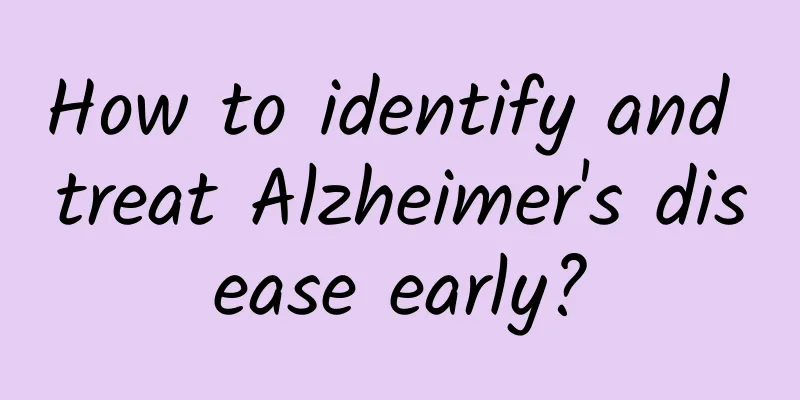How to identify and treat Alzheimer's disease early?

|
Yesterday we talked about how to care for Alzheimer’s disease. Today let’s talk about how to identify and treat Alzheimer’s disease early? Based on our current understanding of Alzheimer's disease, although we generally lack a cure, early detection and early treatment can slow the progression of Alzheimer's disease and allow Alzheimer's patients to achieve a better quality of life. 01How to achieve early detection? Alzheimer's disease does not appear suddenly, but is a gradual process of brain damage that can be observed from many aspects. 1. Memory loss. Memory loss is the most common symptom of Alzheimer's disease. Patients will not only show a decline in short-term memory, but also a loss of long-term memory. Of course, the memory of normal elderly people also declines, but if the memory decline is more obvious, then it should be paid special attention. 2. Language and thinking disorders. If the elderly have language and thinking disorders, such as slow speech, incoherent speech, or unclear thinking logic, you should also pay attention to it. 3. Behavioral and emotional changes. If the elderly become withdrawn or inconsistent with their past overall habits, stay away from social activities, and have mood swings, frustration, depression, or mania, these may be signs of Alzheimer's disease. In addition, if there are problems such as loss of sense of direction, we also need to pay attention. These are common manifestations of early Alzheimer's disease, but we need to distinguish between normal aging, occasional changes and long-term changes, so we also need to pay more attention to the elderly and observe them more carefully. Of course, if you want to conduct more accurate tests on these, you need clinical diagnosis. Currently, clinical diagnosis includes imaging, neuropsychological tests such as the Montreal Cognitive Assessment Scale, body fluid marker tests, and genetic tests, which need to be performed in a specialized hospital. 02How to choose a medical department ? If you seek medical treatment, which departments should you choose? Depending on the hospital settings, neurology, psychiatry, psychology and geriatrics may all be involved in the diagnosis of Alzheimer's. In the hospital, there are special and more accurate measurement methods. The common measurement methods are as follows: (1) Neuropsychological testing Clinically, there are professional neuropsychological assessment methods for Alzheimer's disease, such as the internationally used Montreal Cognitive Assessment Scale, which can evaluate the patient's disease progression from multiple aspects such as memory, attention, language, spatial perception and execution. (2) Imaging testing For Alzheimer's patients, MRI and CT tests are currently the most common, which use imaging to observe changes in the patient's brain. (3) Biomarker detection Alzheimer's disease can lead to changes in a series of biomarkers, such as changes in Aβ and tau protein in cerebrospinal fluid, among which cerebrospinal fluid is more relevant, but this invasive test is less acceptable. There are also some new technologies such as positron emission tomography-computed tomography (PET-CT), which can detect typical pathological features of Alzheimer's disease such as Aβ and tau protein. (4) Genetic testing Alzheimer's disease is closely related to genes, so genetic testing can also identify Alzheimer's disease to a certain extent, but genetic research is still ongoing. Of course, these tests should be combined with the patient's clinical manifestations for overall evaluation. Let's talk about early treatment. 03How to intervene early? Early intervention is an important strategy for dealing with Alzheimer's disease. Since the damage to the brain caused by Alzheimer's disease is irreversible, the earlier the intervention, the more it can slow down the damage to the brain caused by the disease, and the better the treatment effect and performance. Currently, the intervention for Alzheimer's disease includes drug intervention and non-drug intervention. 1. Drug intervention - follow the doctor's advice. There are some corresponding drugs that may have a certain therapeutic effect on Alzheimer's disease, including cholinesterase inhibitors, neurotransmitter drugs, etc. Of course, there are also some new drugs and therapies under research and exploration. These can be followed by the doctor's advice. 2. Non-drug intervention: some possible recovery or cognitive training In our daily life, what we need more is non-drug intervention for Alzheimer's disease, which is more significant. It can not only improve the life attitude and psychological state of Alzheimer's patients, but also may improve the condition of Alzheimer's disease to a certain extent. 04What are the methods of non-drug intervention? Some netizens asked, what are the non-drug intervention methods? (1) Cognitive intervention. Cognitive intervention is a very effective strategy for dealing with Alzheimer's disease. Effective cognitive intervention can improve the cognitive abilities of patients with Alzheimer's disease. The reason behind this may be that these interventions can have a direct effect on the brain, thereby affecting multiple areas of the brain. Common cognitive training methods include cognitive training, cognitive stimulation, and cognitive rehabilitation. The most common type of cognitive training is memory training, such as asking patients to organize, classify, cluster, and memorize the location of certain content, as well as face-name association, visual image, and other memory. Of course, we can actually consciously conduct memory training based on the specific situation of the elderly in our daily lives, such as remembering the names of common items, names of people, and the placement of objects. [3] At the same time, learning new knowledge is also a good way of cognitive intervention, such as reading, calculation or foreign languages. Some studies have even pointed out that chess and card games are also a good way of cognitive intervention to a certain extent. These games involve memory and calculation, and involve multiple people and communication, which may be more suitable for the elderly. With the popularity of electronic products in recent years, computers, mobile phones and even electronic games have also helped the elderly to a certain extent. It can be said that those contents that can promote brain thinking and thinking often have the potential for cognitive intervention. (2) Exercise intervention. Exercise intervention is also very beneficial to the recovery of Alzheimer's disease. Common exercise interventions include aerobic exercise, resistance exercise, and mind-body exercise. Aerobic exercise can better improve the body's metabolic capacity, improve the oxygen utilization of the heart, brain, and lungs, and help improve cognition, so the elderly can try strategies such as running and cycling. Resistance exercise is often carried out using sports equipment or weight training. In addition, some soothing mind-body exercises such as Tai Chi and yoga. These exercises can also improve the physical fitness of the elderly, help them cope with diseases, and improve their physical and mental state. At the same time, asking patients to do some housework within their ability is also a form of exercise intervention. Don't take on everything. (3) Daily social communication. Many elderly people have become isolated and unwilling to communicate, and many may live alone, which may also aggravate Alzheimer's disease. Therefore, increasing the social interaction of the elderly is also an effective way to improve their condition. This is also supported by relevant research, that is, the wider the social network and the higher the degree of social participation, the less likely the cognitive ability of the elderly will decline. Therefore, the elderly should participate in more social activities, whether communicating with relatives and friends or neighbors, which is helpful for the elderly's cognition. We should encourage the elderly to go out and participate in more social activities. In addition, reducing some bad habits such as smoking and drinking and ensuring good sleep are also effective intervention strategies. The above content is only for disease knowledge popularization. If you have related symptoms, it is recommended to seek medical attention in time. In general, care is a very complicated matter for patients with Alzheimer's disease, and the specific care is very diverse because of differences between people. We must not only keep the elderly safe, but also let them live comfortably and happily. Therefore, it is particularly important for caregivers to try to adjust their emotions and states, and better understand that the cognitive abilities of patients with Alzheimer's disease are different from those of ordinary people so that they can provide more attentive and patient care. At the same time, through the effective combination of early diagnosis and early care, Alzheimer's disease patients and their families can better cope with the challenges of the disease, improve their quality of life, and delay the progression of the disease. literature: [1] Shan Wei, Wang Yongjun. Diagnosis and prevention of early Alzheimer's disease[J]. Health Care and Medical Garden, 2023, (07): 16-18. [2] Fu Chaowei. Prevention is the key to Alzheimer's disease: Interpretation of the "China Alzheimer's Disease Report 2021"[J]. Diagnostics Theory and Practice, 2022, 21(01): 8-11. [3] Wang Gang, Qi Jinlei, Liu Xinya, et al. China Alzheimer's Disease Report 2024[J]. Diagnostics Theory & Practice, 2024, 23(03): 219-256. |
<<: Zoonotic disease with a mortality rate of 20-40% - human infection with Streptococcus suis
Recommend
Women who don't eat breakfast will hurt their uterus
Nowadays, many people have the habit of skipping ...
Can you get pregnant 4 days before your period?
In our lives, many women will not choose to take ...
Standardization study on exercise rehabilitation and functional training in geriatric general medicine
In general geriatric medicine, exercise rehabilit...
Is it normal to still have bleeding 10 days after abortion?
In daily life, there are many female friends who ...
How to treat breast cancer best
Some women do not pay attention to proper health ...
Is it normal to not have your period for two months?
Female friends will have menstrual periods every ...
I haven't had my period for 3 months.
Some 20-year-old girls who have just graduated an...
What is thyroid pregnancy?
If some patients suffer from thyroid diseases, th...
Can you really avoid nutritional deficiencies by taking supplements alone?
The pace of life of modern people is indeed getti...
International Amyloidosis Day│ No more than 10 cases per million people! What is the rare "amyloidosis"?
Systemic light chain (AL) amyloidosis is a rare d...
Is there a zero-gravity restaurant in Hangzhou? How is the zero-gravity restaurant in Hangzhou?
Friends who often watch Douyin and Kuaishou must ...
Preventive nursing care: the key to reshaping a healthy life
In modern society, with the accelerated pace of l...
Causes of postpartum depression in women
Postpartum depression is a mental illness that wo...
Causes of vaginitis in pregnant women
Many pregnant women do not pay attention to their...









